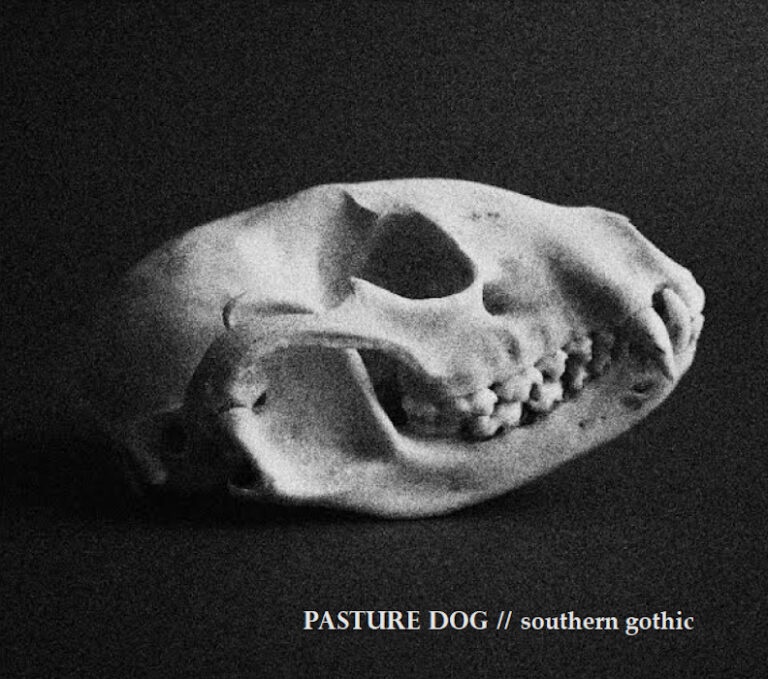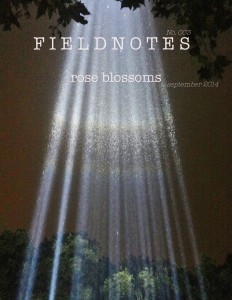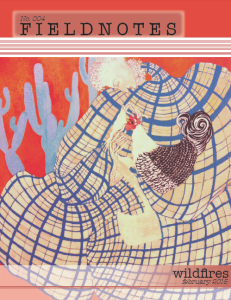Pasture Dog is Alexa Masi from Boston, MA, another addition the ranks of important-feeling bedroom artists (some of which are now well beyond their bedrooms) like Mitski, Adult Mom, Kissing Fractures, Small Wonder, Cyberbully Mom Club etc. etc.
The latest Pasture Dog release is Southern Gothic, a collection of songs that uses a combination of everyday life-type scenes and vivid, strange imagery to create something equal parts unsettling and comforting, just as the title suggests. Lots of music that is inspired by Southern Gothic fails to get past the weird-for-weird’s-sake sort of deal where oddity or perversity or violence is included because it seems to add indistinct depth, but Masi’s songwriting manages to capture the wider perspective. Here, the strangeness is specific and targeted, cathartic confessional hymns to critique human behaviour and the good ol’ Social Norms it has created.
‘Lazarus Saturday Sulking’ kicks things off, a song packed with Biblical references that serves as an intimate exploration of gender roles and sexual identity. Masi’s narrator is isolated and, worse, understands enough to resent the isolation to the degree that it forces her into deeper isolation (and so on etc.), a sort cyclical it-really-fucking-sucks-that-this-has-to-be-so-hard-and-that-makes-it-harder situation, as made clear by the inability to communicate which lays at the core of the song:
“I’ve been coughing up “sweetheart” into the crook of my arm. It’s force of habit, it’s the crime I commit. But he calls me baby like an insult. To bury my love is an old art. And I’ll do it again.”
Masi’s lyrics are poetic, reading like a stream of thoughts scribbled down late at night when gripped by an overwhelming urge to say everything, be it to a loved one or herself. “Because I can’t stay so long in the same static place,” Masi sings on “Louie’, “and I can’t sustain to make all the same mistakes, over again and over again.” ‘Garden Tomb’ has a dreamy feel, the slight reverb acting as a subtle funhouse mirror, rippling the track in odd ways, while ‘Labrador Blue’ opens with a more hopeful guitar strum: “I don’t worry anymore,” declares Masi, “I don’t get so overwhelmed,” although this positivity does not seem to last as the song closes with the narrator feeling blue while reminiscing about the past.
‘Lizard Patrol’ speaks of the confused line between positive/negative identity perspectives, the indecision of (or oscillation between) 1. hating yourself, 2. understanding that you don’t hate yourself and 3. working towards conditions where it would be considered normal not to have to hate yourself should you choose to embrace the image you envisage as You. It’s bizarre situation of understanding what is right and moral while being susceptible to all the pain and doubt that the human body/mind is so good at, pain and doubt which leads to self-limitation and sabotage even though your rational clear-headed opinions know you are moving in the right direction:
“I can’t let my thoughts get so outstretched. but really I was limiting myself, and limited the ways that I could fix – oh god how am I gonna fix it?”
The theme of an internal dissonance between love, hate and acceptance is made clearer on the final track. ‘Everything That Rises Must Converge’ is named after a Flannery O’Connor story, a tale concerning a recent graduate named Julian. The man is ashamed of his mother’s racist perspective yet fails to connect with any of the African American characters, highlighting an inherent racism in his own personality. “True culture is in the mind” he argues, only for his mother to counter “it’s in the heart.” Julian feels like a transitionary stage between past bigotry and future tolerance – he knows what he ought think yet still harbours the subconscious prejudices that are a product of the society in which produced him. For me, Pasture Dog explores the twenty-first century equivalent of this, that is, the exact same thing. Be it with racial equality or sexual/gender identity, it seems many have accepted the theory of equal rights (ie. in their minds) without fully embracing the change of attitude on a deeper subconscious level (in their hearts). Masi explores the very real pain suffered by someone on the wrong end of this inconsistency, someone trapped in and tormented by the outdated heart-shaped morality that pokes through in even the most well-meaning person or society.
You can grab the album on a pay-what-you-can basis via Bandcamp.
P.S. For those of you who are into pictures and words, Masi also runs the art magazine Field Notes, which collects a variety of visual and literary pieces into a colourful journal. All of the issues are available online here.



